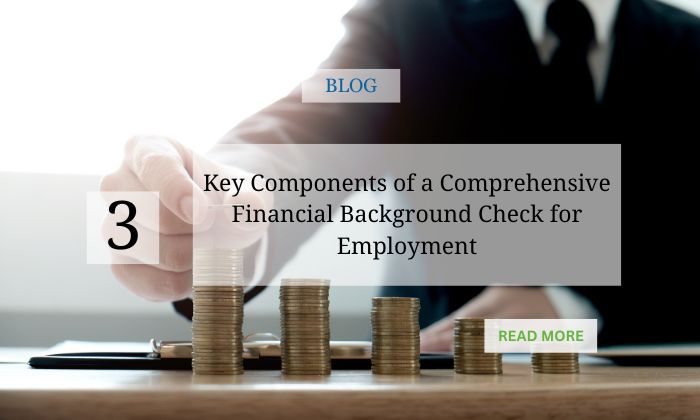Given the heightened security demands and intricate financial rules, financial institutions have a crucial task in selecting those fit to manage both company and customer data and finances. It’s vital to know the background and identity of potential hires. Conducting thorough financial services background checks and screening candidates against important sanctions and watch lists is essential to ensure trustworthy employees.
By taking these steps, you safeguard sensitive information and maintain compliance, reducing the risk of theft or financial crimes against your business. This is particularly critical for employees in banking roles.
Work with a background check provider like Securecheck360
Here at Securecheck360, we’re experts in delivering reliable, fast turnaround and affordable Employment Background Screening Services, serving businesses of all sizes across the globe. Our customized solutions are finely tuned to meet the unique requirements of small, mid-sized, and large organizations. We’re dedicated to equipping companies with the vital tools and insights they need to make well-informed hiring choices. As one of the leading background verification companies, we’re committed to supporting even small businesses as trusted background check companies for small businesses to ensure they have the confidence to build the best teams for their success.
To know more about our services, book your free demo today!
Why Are Financial Services Background Checks Important?
Financial institutions have a big task: ensuring they hire trustworthy, honest, and capable individuals. It’s not just about qualifications; it’s also about ensuring they can handle the responsibilities of the job. After all, financial services employees handle sensitive data and cash belonging to both the company and its customers.
Skipping financial services background checks could lead to serious consequences like embezzlement and identity theft, not to mention legal issues due to negligent hiring. These checks aren’t just about ticking boxes; they’re about building trust and integrity within the organization.
Performing a financial services background check provides the following benefits:
- Keep things in line with regulations
- Protect customer privacy
- Lower the risk of crime
- Create a safer workplace
- Boost team morale
- Safeguard the company’s reputation
The 3 Key Components of a Comprehensive Financial Background Check
Because of the access that employees have to consumers’ sensitive information and the financial institution’s money, the three most important background checks requested are :
1. Criminal Background Check
When conducting a criminal background check, any criminal convictions will typically include details such as the date of the offense, the nature of the offense, whether it was classified as a felony or misdemeanor, the final disposition of the case, the date of that disposition, and sometimes information about the sentence imposed. This process provides a comprehensive overview of an individual’s past involvement with the criminal justice system and helps employers make informed decisions regarding their suitability for a particular role.
2. Credit History
Although some states prohibit employers from conducting credit checks, financial services employers typically have exemptions from these restrictions. When conducting a credit history search, employers can expect to find details such as late or missed payments, accounts in collections, records of foreclosures or repossessions, creditor judgments, and defaulted loans. These insights into an individual’s financial history can be particularly relevant for employers in the financial sector, helping them assess a candidate’s reliability and suitability for roles involving fiscal responsibilities.
3. Employment Verification
When conducting employment verification, you’ll gain access to essential details about each of the applicant’s previous positions. This includes information such as the name and address of the employer, the duration of employment, and the specific titles or positions held during their tenure. By verifying these key aspects of an applicant’s work history, employers can gain valuable insights into their professional experience and suitability for the role in question. This process helps ensure that candidates have the relevant background and expertise necessary to contribute effectively to the organization.
How to Stay Compliant When Conducting a Financial Background Check
When you opt to collaborate with a third-party background check provider, they assist you in navigating the complexities of compliance with regulations like the Fair Credit Reporting Act (FCRA) and local laws governing background screenings. Once you’ve received the background check report, it’s up to you as the employer to determine whether to proceed with the hiring process.
If you choose not to hire the applicant based on information uncovered in their background check, you must follow the necessary Adverse Action procedures. These steps entail issuing a pre-adverse action letter, allowing the applicant time to address any inaccuracies, and ultimately making a final decision on their employment status. If the decision remains not to hire, you must send an official adverse action letter to the applicant, including copies of the background report and the document outlining their rights under the FCRA.
Given the critical importance of thorough financial services background checks, it’s advisable to engage a trusted third-party provider like securecheck360 to ensure compliance and informed decision-making in your hiring process.
Financial Services Background Check Laws
Employers, especially in financial services, must adhere to various local, state, and federal laws regarding background checks during hiring processes. Here are key regulations:
- Fair Credit Reporting Act (FCRA): Governs what consumer reporting agencies (CRAs) can report. For positions under $75,000/year, CRAs can’t report certain information over seven years old unless salary exceeds the threshold. FCRA mandates an adverse action process if information leads to a rejection.
- Title VII of the Civil Rights Act of 1964: Prohibits workplace discrimination based on protected characteristics. Employers must assess convictions concerning job duties before rejecting an applicant.
- Federal Deposit Insurance Act (FDIA): Imposes restrictions on hiring applicants with specific convictions related to trust or fiduciary duty breaches and money laundering. A new rule eases restrictions on hiring applicants with certain convictions under specific circumstances.
- Amendment to Sect. 19 of the FDIA: Contains amendments regarding background checks for positions in banks and credit unions. Narrows the types of offenses needing FDIC approval before hiring and provides guidance on crimes of dishonesty. Employers should review their background check policies in light of these changes.
Understanding and adhering to these laws ensures compliance and informed decision-making during the hiring process, particularly in financial services.
Conclusion
When conducting a thorough financial background check for employment, three essential components come into play: Criminal Background check, Examining Credit History and verifying employment records. These elements offer employers valuable information about an applicant’s financial reliability, professional experience, and educational qualifications, enabling them to make well-informed decisions when selecting candidates and fostering a trustworthy workforce.







